Are you passionate about technology and eager to carve a successful career in the dynamic world of IT? The demand for skilled IT professionals continues to skyrocket, making it an exciting time to embark on a rewarding journey in this field. But with a constantly evolving landscape, navigating the path to success can seem daunting. This roadmap provides an insightful guide to building a thriving IT career in 2024 and beyond, equipping you with the knowledge, skills, and strategies to thrive in this exciting industry.
From identifying in-demand IT roles and understanding the latest technologies to developing essential soft skills and navigating the job market, this comprehensive guide covers all the key aspects of building a successful IT career. Whether you are a recent graduate, a seasoned professional seeking a career change, or simply looking to enhance your current skills, this roadmap will empower you to make informed decisions, navigate the competitive landscape, and achieve your career goals in the ever-evolving world of IT.
Understanding the Evolving IT Landscape
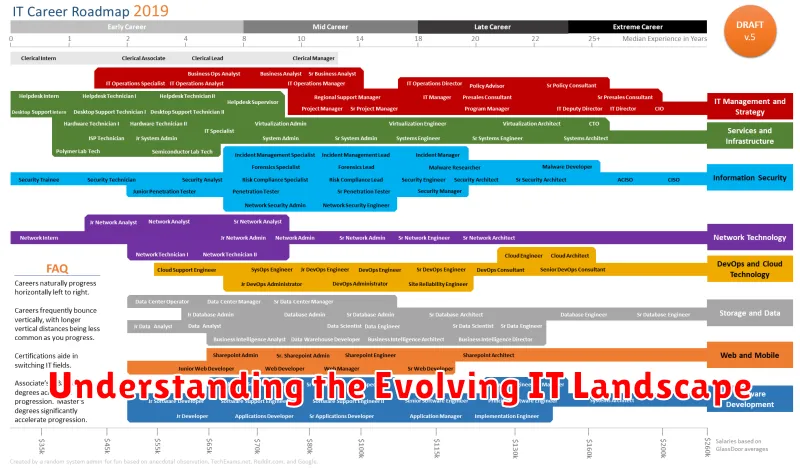
The world of Information Technology (IT) is constantly evolving, with new technologies and trends emerging at an unprecedented pace. This rapid transformation presents both exciting opportunities and significant challenges for businesses and individuals alike. To navigate this dynamic landscape successfully, it’s crucial to understand the key drivers of change and the implications for the future of IT.
Key Drivers of IT Evolution
Several factors are shaping the evolution of the IT landscape, including:
- Cloud Computing: The shift from on-premise infrastructure to cloud-based solutions has revolutionized how businesses access and manage IT resources. Cloud computing offers scalability, flexibility, and cost-effectiveness, making it a dominant force in the IT landscape.
- Artificial Intelligence (AI): AI is rapidly transforming various industries, from customer service to healthcare. Machine learning, deep learning, and natural language processing are enabling businesses to automate tasks, analyze data, and make more informed decisions.
- Internet of Things (IoT): The increasing connectivity of devices and objects is creating a vast network of data that can be harnessed to optimize processes, improve efficiency, and create new business models.
- Cybersecurity Threats: As technology evolves, so do the threats. Cybersecurity breaches are becoming increasingly sophisticated, requiring businesses to invest in robust security measures and stay ahead of emerging vulnerabilities.
- Data Analytics and Big Data: The exponential growth of data has led to the emergence of big data analytics, which empowers businesses to extract valuable insights and make data-driven decisions.
Implications for the Future of IT
The evolution of IT has profound implications for businesses and individuals:
- Increased Automation: AI and automation are expected to displace certain job roles, while creating new opportunities in areas like data science, AI development, and cybersecurity.
- Enhanced Customer Experiences: IT advancements are enabling businesses to personalize customer experiences, offer more convenient services, and improve customer satisfaction.
- New Business Models: The interconnectedness of devices and the availability of vast data sets are creating opportunities for innovative business models that leverage the power of IT.
- Growing Demand for Skilled Professionals: The demand for IT professionals with expertise in cloud computing, AI, cybersecurity, and data analytics is expected to grow significantly.
Adapting to the Evolving IT Landscape
To thrive in the evolving IT landscape, individuals and businesses need to embrace continuous learning, adapt to new technologies, and invest in skills development. By staying informed about the latest trends and proactively embracing change, organizations can leverage the power of IT to achieve their goals and stay ahead of the curve.
Identifying Your Niche and Career Goals
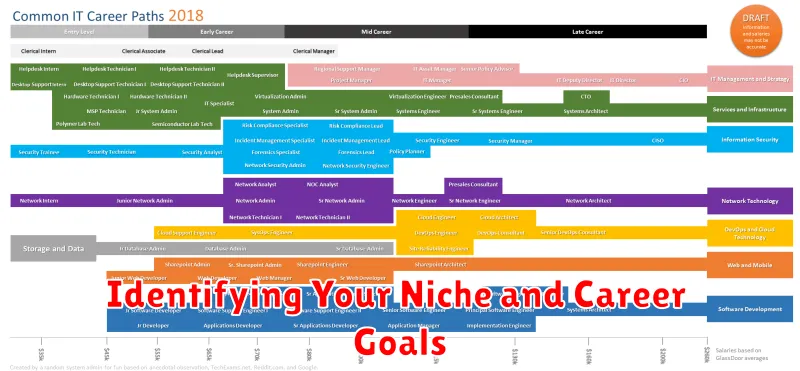
In the vast and ever-evolving landscape of the professional world, it is crucial to pinpoint your unique niche and set clear career goals. This process is not only essential for personal growth and fulfillment but also for achieving professional success. By identifying your niche, you gain a competitive edge and differentiate yourself from others in the job market. Moreover, establishing specific career goals provides direction and motivation, enabling you to navigate your career path with intention and purpose.
Defining Your Niche
Your niche represents your specific area of expertise or interest within your chosen field. It’s what makes you stand out from the crowd and allows you to focus your efforts on a particular segment of the industry. To identify your niche, ask yourself the following questions:
- What are your strengths and talents?
- What are you passionate about?
- What problems or needs can you solve?
- What industries or sectors are you drawn to?
- What are the current trends in your field?
Once you have a good understanding of your strengths, passions, and the market landscape, you can begin to identify potential niches that align with your interests and skills.
Setting Achievable Career Goals
Establishing specific and achievable career goals is essential for guiding your professional journey. Goals provide a clear target and a sense of direction, keeping you motivated and focused. When setting your goals, consider the following factors:
- SMART goals: Ensure your goals are Specific, Measurable, Achievable, Relevant, and Time-bound.
- Long-term vision: Think about your ultimate career aspirations and break them down into smaller, more manageable goals.
- Personal values: Align your goals with your personal values and priorities to ensure they are meaningful and fulfilling.
- Continuous learning: Embrace a growth mindset and commit to ongoing professional development to enhance your skills and knowledge.
Benefits of Identifying Your Niche and Setting Career Goals
Identifying your niche and setting career goals offers numerous benefits, including:
- Increased focus and productivity: By knowing your area of expertise, you can concentrate your efforts on specific tasks and projects that align with your goals.
- Enhanced career growth: Targeting specific goals and developing your niche can lead to rapid career progression and advancement.
- Greater job satisfaction: Working in a field that aligns with your passions and strengths can contribute to a more fulfilling and enjoyable work experience.
- Improved marketability: Specializing in a particular niche makes you a valuable asset to potential employers and increases your chances of landing your dream job.
Conclusion
Identifying your niche and setting career goals is a crucial step towards achieving professional success and personal fulfillment. By understanding your strengths, passions, and the market landscape, you can carve out a path that aligns with your aspirations and leads to a rewarding career journey.
Essential Technical Skills to Master

In today’s rapidly evolving technological landscape, possessing a strong foundation in technical skills is crucial for career advancement and success. Whether you’re a seasoned professional or just starting out, mastering essential technical skills can unlock numerous opportunities and empower you to thrive in the digital age. Here are some of the most sought-after technical skills that you should consider developing:
1. Programming Languages
Programming languages are the backbone of software development and are essential for building websites, mobile applications, and other software solutions. Popular programming languages include:
- Python: A versatile language known for its readability and extensive libraries.
- JavaScript: A front-end language that powers interactive web applications.
- Java: A robust language widely used for enterprise applications.
- C++: A high-performance language used for system programming.
2. Data Analysis and Visualization
Data analysis skills are in high demand as organizations strive to make data-driven decisions. Essential tools and techniques include:
- SQL: A standard language for querying and managing data in relational databases.
- Python libraries like Pandas and NumPy: Powerful tools for data manipulation and analysis.
- Data visualization tools like Tableau and Power BI: Used to create insightful charts and dashboards.
3. Cloud Computing
Cloud computing platforms like Amazon Web Services (AWS), Microsoft Azure, and Google Cloud Platform (GCP) are transforming how businesses operate. Understanding cloud concepts and services is essential for:
- Deploying applications
- Managing infrastructure
- Scaling applications
4. Cybersecurity
With increasing cyber threats, cybersecurity skills are becoming increasingly important. Key areas of expertise include:
- Network security
- Vulnerability assessment
- Incident response
5. Project Management
Effective project management is crucial for delivering successful technology projects. Key skills include:
- Planning and scheduling
- Risk management
- Team communication
Mastering these essential technical skills can provide you with a competitive edge in the job market and open doors to exciting career opportunities. Whether you’re pursuing a career in software development, data science, cloud computing, or cybersecurity, developing a solid technical foundation is paramount for success.
The Power of Soft Skills in IT
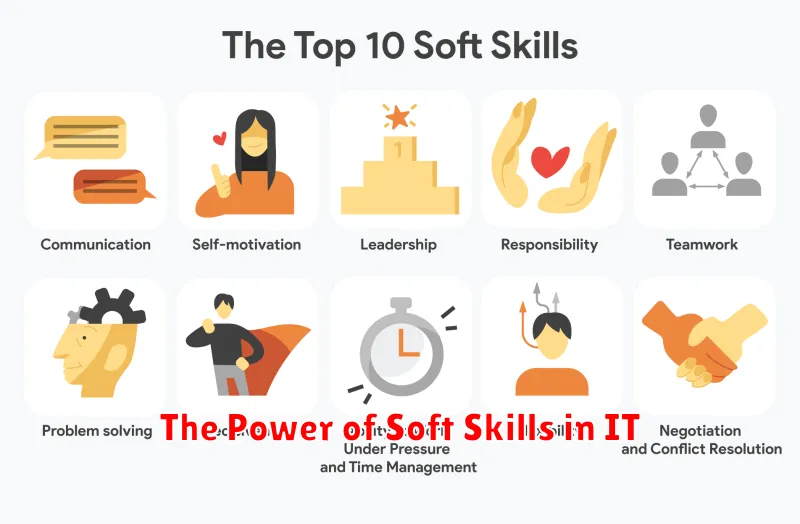
In the ever-evolving landscape of technology, it’s easy to get caught up in the technical aspects of the field. From mastering complex coding languages to understanding intricate networks, the focus often lies on hard skills. However, what many fail to realize is the immense value of soft skills in IT. These intangible abilities, often overlooked, play a crucial role in driving success in the tech industry.
Communication, for instance, is an essential soft skill that can bridge the gap between technical experts and non-technical stakeholders. Being able to effectively convey complex technical information to clients, managers, or colleagues with varying levels of understanding is vital for collaboration, project success, and customer satisfaction. A clear and concise communication style can ensure everyone is on the same page, leading to better outcomes.
Beyond communication, problem-solving is another critical soft skill in IT. Technical issues can arise at any time, demanding quick thinking and creative solutions. Strong problem-solving skills allow IT professionals to analyze complex situations, identify root causes, and implement effective solutions efficiently. This ability to adapt to unforeseen challenges and find practical resolutions is highly valued in the industry.
Moreover, teamwork is essential for success in IT, especially in today’s collaborative work environments. The ability to work effectively with others, share knowledge, and contribute to a shared goal is paramount. Individuals with strong teamwork skills can foster a positive work atmosphere, promote open communication, and drive innovation through collective efforts.
In conclusion, while hard skills are certainly important in the IT field, it’s essential to recognize the significant impact of soft skills on professional growth and success. By developing and honing skills like communication, problem-solving, teamwork, and adaptability, IT professionals can navigate the challenges of the industry, contribute effectively to teams, and establish themselves as valuable assets in the tech world.
Building Your Professional Network
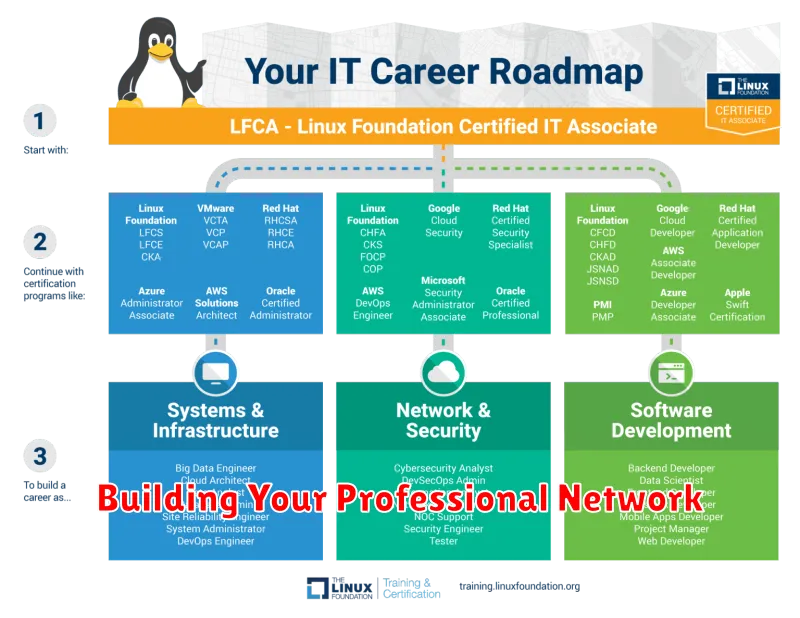
Networking is an essential part of success in any field. It allows you to connect with others in your industry, learn from their experiences, and gain access to new opportunities. But building a strong professional network can feel daunting, especially if you’re just starting out. This article will provide you with a comprehensive guide to building a thriving professional network, covering key strategies, tips, and resources to help you navigate the world of networking with confidence.
Start with your existing connections
Before reaching out to new people, consider your current connections. Think about your friends, family, former classmates, and colleagues. You may be surprised at the diverse range of professionals you already know. Reach out to them, let them know you’re looking to expand your network, and ask for introductions to people in their fields. These connections can be invaluable in opening doors and providing insights.
Attend industry events
Industry events such as conferences, workshops, and meetups offer excellent opportunities to connect with like-minded professionals. Take the time to attend these events and actively engage in conversations with attendees. Remember to introduce yourself, share your interests, and be genuinely interested in learning about others. These interactions can lead to valuable relationships and potential collaborations.
Join professional organizations
Professional organizations provide a structured environment for networking and professional development. Joining organizations relevant to your field allows you to connect with experts, attend educational seminars, and participate in networking events. These organizations often offer membership directories and online platforms, facilitating communication and collaboration among members.
Leverage social media
Social media platforms like LinkedIn and Twitter have become indispensable tools for professional networking. Create a compelling profile, connect with individuals in your industry, and engage in relevant conversations. Share your thoughts and insights, participate in online discussions, and actively seek out opportunities to connect with professionals through social media. Consider joining relevant groups and following industry leaders to stay informed and connected.
Follow up and stay in touch
Networking is a two-way street. After connecting with someone, follow up with them, express your gratitude for their time, and continue to engage with them. Stay in touch through social media, email, or phone calls. Building genuine relationships takes time and effort, and consistent communication is key to fostering strong connections.
Be a valuable resource
The best way to build a strong network is to be a valuable resource for others. Offer your support, share your knowledge, and be willing to help others achieve their goals. When you are genuinely helpful and supportive, you create a positive reputation and build trust, fostering mutually beneficial relationships. Remember, networking is not just about gaining something for yourself, it’s about building a community of support and collaboration.
Be patient and persistent
Building a robust professional network takes time and effort. Don’t get discouraged if you don’t see immediate results. Stay patient, persistent, and continue to engage with others. As you build relationships, you’ll gradually expand your network and unlock new opportunities. Remember that consistency and authenticity are key to building meaningful connections.
Embrace the power of your network
A strong professional network is a valuable asset. It provides support, guidance, mentorship, and opportunities for growth. Leverage your network to seek advice, explore career opportunities, and collaborate on projects. By actively nurturing your professional connections, you’ll unlock your potential and achieve your goals.
Gaining Practical Experience: Internships and Entry-Level Roles

In today’s competitive job market, gaining practical experience is crucial for recent graduates and those looking to make a career transition. Internships and entry-level roles provide valuable opportunities to develop skills, build your network, and gain real-world experience. While these may seem like stepping stones, they play a vital role in shaping your career path and establishing a foundation for future success.
Internships: A Gateway to the Professional World
Internships offer a structured and supervised environment to gain exposure to various aspects of a particular industry or profession. They provide hands-on experience, allowing you to apply theoretical knowledge learned in academia to real-world scenarios. As an intern, you’ll typically work on projects under the guidance of experienced professionals, learning practical skills and gaining insights into the day-to-day operations of a company.
Here are some key benefits of internships:
- Skill Development: Internships provide opportunities to hone skills like communication, teamwork, problem-solving, and project management.
- Networking: Internships allow you to build connections with industry professionals, which can be invaluable for future career prospects.
- Career Exploration: Internships help you determine if a particular field or company aligns with your interests and career goals.
- Resume Builder: A well-structured internship experience strengthens your resume, demonstrating your skills and experience to potential employers.
Entry-Level Roles: Building a Foundation
Entry-level roles are the first professional positions held after graduation or after gaining relevant experience through internships. These roles typically provide a solid foundation in the chosen field, offering opportunities for growth and advancement. They allow you to put your acquired knowledge and skills to the test and gain hands-on experience in a specific area.
Here are some key benefits of entry-level roles:
- Practical Experience: Entry-level roles provide valuable experience in performing core job duties and contributing to the company’s goals.
- Skill Refinement: These roles help refine skills acquired during internships or education, allowing you to apply them in a professional setting.
- Career Advancement: Entry-level roles serve as a starting point for career progression, offering opportunities for promotions and increased responsibilities.
- Professional Development: Many companies offer training programs and opportunities for professional development to support the growth of their entry-level employees.
Finding Opportunities
There are various resources available to help you find internships and entry-level roles. These include:
- University Career Centers: Most universities have dedicated career centers that offer job postings, workshops, and career advising services.
- Online Job Boards: Websites like Indeed, LinkedIn, and Glassdoor host a wide range of internships and entry-level positions.
- Company Websites: Check the career pages of companies you are interested in for internship and job openings.
- Networking: Connect with professionals in your field through networking events, industry conferences, and online communities.
Conclusion
Internships and entry-level roles are essential stepping stones for launching a successful career. They provide valuable experience, skills development, and networking opportunities that can help you stand out in the competitive job market. By actively seeking and engaging in these experiences, you can lay a strong foundation for a fulfilling and rewarding career path.
The Importance of Continuous Learning in IT
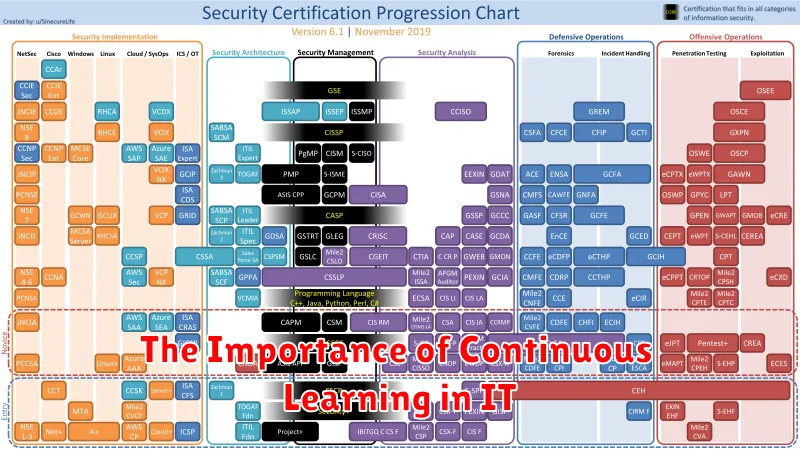
The IT landscape is constantly evolving, with new technologies emerging at a rapid pace. To remain competitive and relevant, IT professionals must embrace continuous learning. This means staying up-to-date with the latest advancements, acquiring new skills, and adapting to the changing demands of the industry.
Benefits of Continuous Learning in IT
The benefits of continuous learning in IT are numerous:
- Enhanced Career Prospects: In a competitive job market, IT professionals with a strong commitment to continuous learning have a distinct advantage. They are more likely to be considered for promotions, secure higher salaries, and be sought after by top employers.
- Increased Job Security: Automation and technological advancements are transforming the IT industry. By continuously learning and acquiring new skills, professionals can future-proof their careers and remain adaptable to evolving job roles.
- Improved Problem-Solving Abilities: Continuous learning exposes IT professionals to a wide range of technologies and problem-solving approaches. This expands their knowledge base and enhances their ability to tackle complex challenges effectively.
- Greater Innovation: By staying informed about the latest trends and technologies, IT professionals can contribute to innovation within their organizations. They can leverage new tools and techniques to optimize processes, improve efficiency, and create cutting-edge solutions.
How to Foster Continuous Learning in IT
Here are some practical tips for IT professionals to foster continuous learning:
- Enroll in Online Courses and Certifications: Numerous online platforms offer comprehensive courses and certifications in various IT disciplines. These resources provide structured learning paths and recognized credentials that enhance credibility.
- Attend Industry Conferences and Webinars: Conferences and webinars offer opportunities to network with peers, hear from industry experts, and learn about the latest trends and advancements.
- Read Technical Blogs and Articles: Staying abreast of industry news and developments through technical blogs and articles is essential. These resources provide insights into new technologies, best practices, and emerging challenges.
- Participate in Online Communities: Engaging with online communities dedicated to IT allows professionals to connect with peers, seek guidance, and share knowledge. These platforms provide valuable learning opportunities and a sense of community.
- Practice and Experiment: The best way to learn is through hands-on experience. IT professionals should dedicate time to practicing new skills, experimenting with different technologies, and building real-world projects.
In conclusion, continuous learning is not just an option, but a necessity for IT professionals in today’s rapidly evolving landscape. By embracing lifelong learning, professionals can enhance their career prospects, improve their problem-solving abilities, contribute to innovation, and thrive in a dynamic and challenging industry.
Seeking Mentorship and Guidance
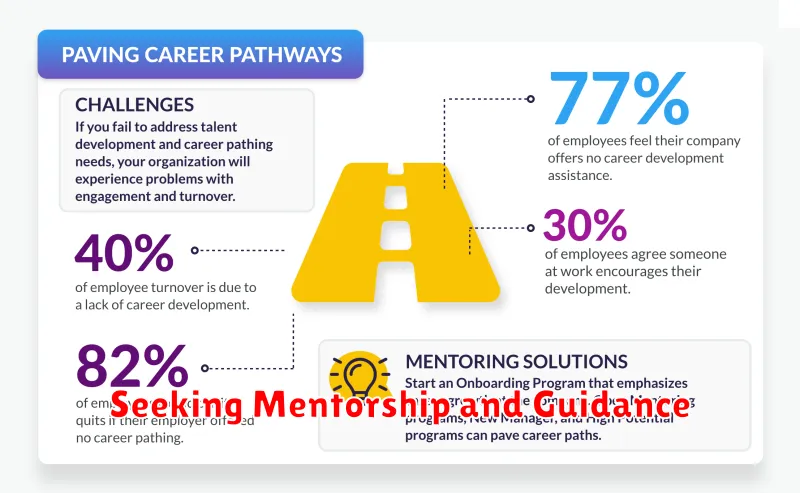
In the ever-evolving landscape of personal and professional growth, seeking mentorship and guidance is paramount. Mentors provide invaluable support, knowledge, and insights that can shape our journeys and propel us towards our aspirations. The benefits of having a mentor are multifaceted and can significantly impact our lives.
Enhanced Knowledge and Skills: Mentors, with their wealth of experience and expertise, can impart valuable knowledge and skills that are not readily available through formal education or training. They can guide us through complex situations, share practical tips, and offer insights based on their own successes and failures.
Career Advancement: Mentors can play a vital role in our career advancement by providing guidance on career paths, networking opportunities, and industry trends. They can also offer feedback on our performance, identify areas for improvement, and advocate for our growth within an organization.
Personal Growth and Development: Mentorship extends beyond professional development and can significantly impact our personal growth. Mentors can provide emotional support, encourage self-reflection, and help us identify our strengths and weaknesses. They can also offer valuable advice on navigating life’s challenges and fostering resilience.
Improved Decision-Making: Having a trusted mentor to bounce ideas off of can improve our decision-making abilities. They can provide objective perspectives, challenge our assumptions, and help us weigh the pros and cons of different options. This can lead to more informed and strategic decisions.
Building Confidence and Motivation: Mentors can serve as a source of inspiration and motivation. Their belief in our abilities and potential can boost our confidence, empower us to take risks, and drive us to achieve our goals.
Finding a Mentor: Seeking mentorship involves proactively connecting with individuals who possess the qualities and experience we seek. It’s essential to identify potential mentors in our field or areas of interest. Networking events, professional organizations, and online platforms can facilitate these connections. Once we’ve identified a potential mentor, approaching them with a clear request for guidance and a genuine interest in learning from their experience is crucial.
In conclusion, seeking mentorship and guidance is a wise investment in our personal and professional development. Mentors provide invaluable support, knowledge, and insights that can shape our journeys and empower us to achieve our full potential. By embracing mentorship, we open doors to new opportunities, accelerate our growth, and navigate life’s complexities with greater confidence and clarity.
Navigating Job Search and Interviewing
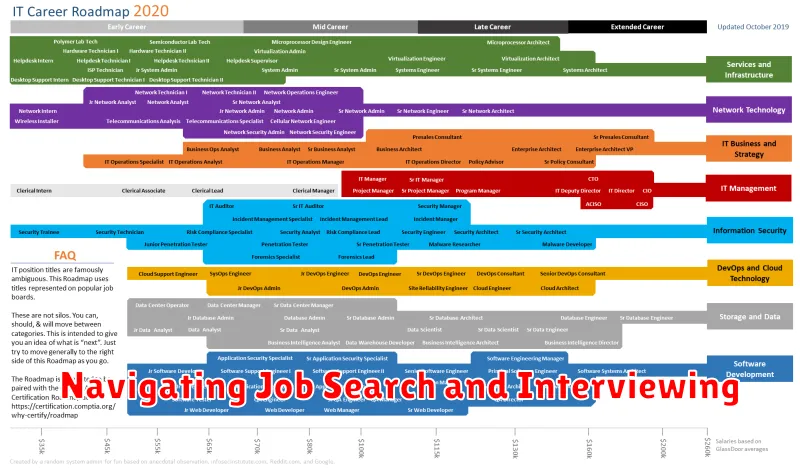
The job search and interviewing process can be daunting, but it doesn’t have to be overwhelming. With the right approach and preparation, you can navigate this process successfully.
Start with self-reflection. Before embarking on your job search, take time to understand your skills, experience, and career goals. What are you passionate about? What type of work environment do you thrive in? What are your career aspirations? Reflecting on these questions will help you identify the right opportunities and tailor your approach effectively.
Build a strong resume and cover letter. Your resume is your first impression, so make sure it’s polished and highlights your relevant skills and experience. Your cover letter should be tailored to each job you apply for and demonstrate your understanding of the role and the company. Highlight your qualifications and explain why you are a perfect fit for the position.
Network with professionals in your field. Networking can be a powerful tool in your job search. Attend industry events, connect with professionals on LinkedIn, and reach out to people in your network for advice and opportunities. Networking can provide valuable insights, leads, and potential job referrals.
Practice your interviewing skills. Being prepared for an interview is crucial. Practice answering common interview questions, prepare for behavioral questions, and research the company and the role thoroughly. Consider practicing with a friend or using online resources to help you prepare.
Follow up after interviews. After each interview, send a thank-you note expressing your gratitude and reiterating your interest in the position. This demonstrates your professionalism and leaves a positive impression.
Don’t get discouraged. The job search can be challenging, but it’s important to stay positive and persistent. Don’t be afraid to ask for help, utilize available resources, and continue learning and growing. With effort and dedication, you will find the right opportunity.
Thriving in Your IT Career: Tips for Success
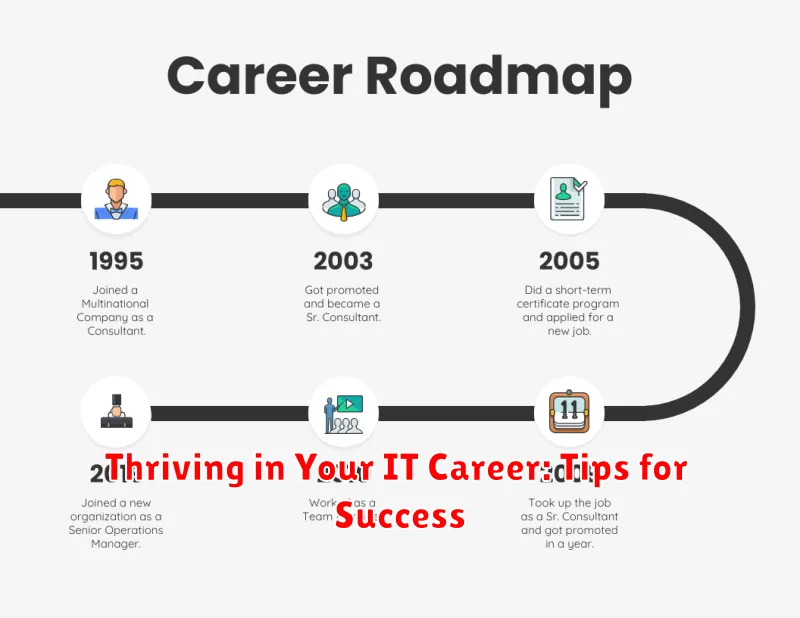
The IT industry is constantly evolving, offering a dynamic and rewarding career path for those who are passionate about technology. To thrive in this competitive field, it’s essential to stay ahead of the curve, continuously learn, and cultivate valuable skills. Here are some tips to help you succeed in your IT career:
1. Embrace Continuous Learning
The IT landscape is constantly changing, with new technologies and tools emerging regularly. To stay relevant, it’s crucial to embrace continuous learning. This means staying updated on industry trends, attending workshops and conferences, and pursuing certifications that validate your expertise. Consider focusing on specialized areas like cloud computing, cybersecurity, or artificial intelligence to gain a competitive edge.
2. Develop Strong Technical Skills
A solid foundation in technical skills is essential for any IT professional. Focus on mastering core programming languages like Python, Java, or C++, and explore frameworks and libraries specific to your chosen area of expertise. Additionally, cultivate skills in areas like database management, network administration, and systems analysis.
3. Cultivate Soft Skills
While technical skills are important, soft skills are equally crucial for success in the IT industry. Effective communication, teamwork, problem-solving, and critical thinking are essential for collaborating with colleagues, clients, and stakeholders. Develop your ability to explain complex technical concepts clearly and concisely, and work effectively in a team environment.
4. Build a Strong Professional Network
Networking is vital for career growth in any field, and IT is no exception. Attend industry events, join online communities, and connect with professionals on LinkedIn. Building relationships with mentors, colleagues, and potential employers can provide valuable insights, career opportunities, and support.
5. Seek Out Mentorship
Having a mentor can provide guidance, support, and valuable advice throughout your career journey. Find someone experienced in the IT industry who can share their knowledge, insights, and experiences. A mentor can help you navigate career challenges, identify development opportunities, and stay motivated on your path to success.
6. Stay Passionate
The IT industry is dynamic and exciting, offering opportunities to work on cutting-edge technologies and make a real impact. Stay passionate about technology, embrace new challenges, and find joy in exploring the constantly evolving landscape. Your passion will fuel your motivation, creativity, and drive for success.
By embracing continuous learning, developing strong technical and soft skills, building a professional network, seeking mentorship, and maintaining your passion, you can thrive in your IT career and achieve your professional goals.

